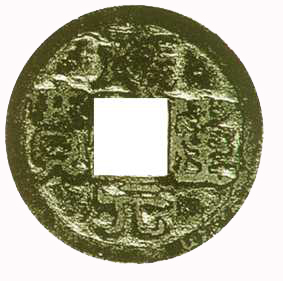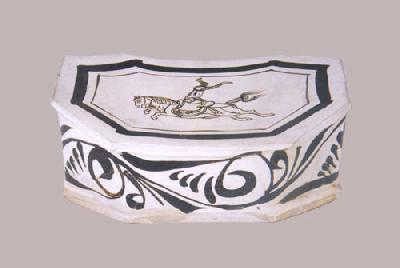 |
| Three-legged celadon wine vessel |
In
959, following the death of Emperor Shizong, who had been a wise monarch, a
seven-year-old child, Emperor Gong, succeeded him on the throne. In the next
year, Zhao Kuangyin seized power and forced Emperor Gong to abdicate the throne.
Zhao took the name Taizu and established his capital in Dongjing (present-day
Kaifeng City). His first task was to abolish military coups by establishing a
professional army that was loyal to the dynasty with military commanders under
the strict control of the central government. For the remainder of his reign,
Taizu concentrated his efforts on winning over the southern states. Such was his
legacy at the time of his death in 976. With the exception of Zhejiang, Shanxi,
Nanzhao and the area ruled by the Khitan, the country had come under Song
control and the activities of the warlords had been brought to an
end.
 |
| Copper coin |
Emperor Taizu was
succeeded by his brother, Emperor Taizong, who brought Zhejiang and Shanxi back
to China. He was unsuccessful, however, in driving out the Khitan and was forced
to deal with them on equal terms. From then on the Song Dynasty defended its
borders against invasions and, unlike the Tang, never attained a universal
empire.
 |
| Porcelain pillow of Cizhou
Kiln |
Important steps were taken to strengthen the administration under
the autocratic control of the emperor. The developments were supported by
important changes in the bureaucratic recruitment and the examination process.
Control over the military and the replacement of aristocratic power with
something akin to a meritocracy brought about a stability that allowed the
country to enjoy a period of prosperity due to the expansion of industry,
commerce and agriculture. These factors, in turn, led to the development of new
cities as centers of administration, trade, commerce and industry.
The reform period lasted until the death of Emperor Shenzong in 1086. From
then on there was a decline due to differences between ruling factions and
peasant rebellions. The increased military skills of the three rival powers --
the Liao, Jin and Western Xia -- meant they were able to take advantage of the
weakened country; In 1126, the Jin army conquered Kaifeng after a long siege.
The following year the Northern Song Emperor was deposed and, along with his
son, exiled to Manchuria
.



